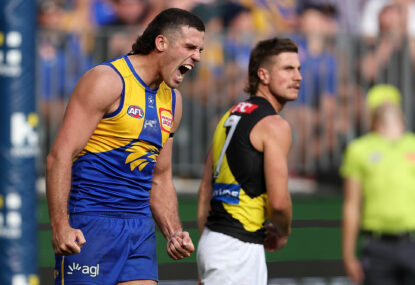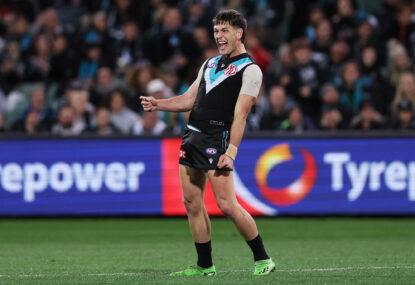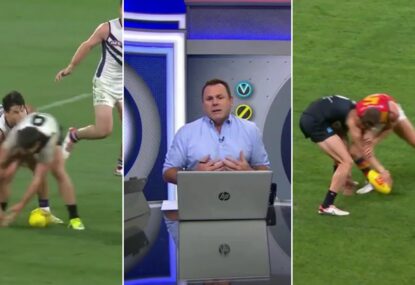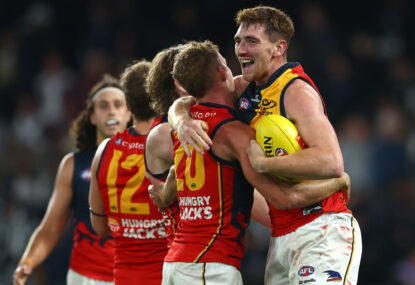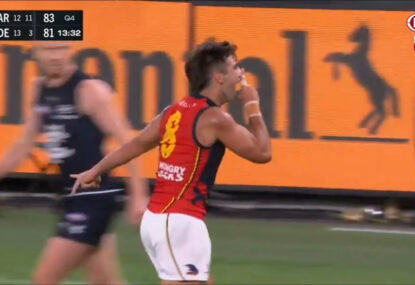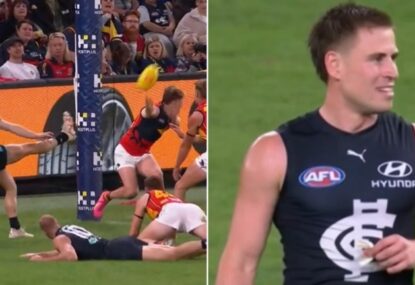“If they win this game it’s been pinched” groaned a despondent Peter McKenna on a cold bleak Adelaide night in Queen’s Birthday eve 1991, moments before Rod Jameson drove a nail into the old VFL.
A beleaguered Fitzroy, on its knees before the recently nationalised AFL executive, had led newcomers Adelaide in low-scorer all night and deserved the four points.
The injustice of that night represented a turning point for the ‘national’ game, and put footy on a path that no Melways owner would be able to find.
The collective cringe after the siren in Melbourne was for the end of an empire, and McKenna’s description of events in the dying seconds – rich with trite uses of the collective noun – invoked some distant Roman watchman spotting a horde of Visigoths.
The ripples of this game stretch back before the 9th of June 1991. The Crows had entered the league in 1991 against their (and the SANFL governing body) will, forced into the new AFL by the impatient master negotiator Ross Oakley who threatened to pick off Port Adelaide or Norwood and include them instead of a unified Adelaide representative.
Like it or not, the institution of VFL and its nostalgic Victorian supporters were going to accept a team from Adelaide. And like it we did not.
Straight away the Crows were reviled east of Horsham. Not least of all because they cheated. (At this point a disclaimer: I was a Melbournian boy watching the game that night so my perspective of this game is coloured (or corrupted, depending on your allegiance) by the “Victorian conspiracy”).
At Football Park the Umpires always favoured the home side. The “Crow Throw” immediately became part of the lexicon, and Monday morning bile was heaped on Graham Cornes’ men.
In retrospect, the tiny handball and clever stoppage play that required it was a portent to future heroes like Sam Mitchell and Scott Pendlebury – but in 1991 it was league-endorsed cheating. It made a lot of sense to your average Victorian that the AFL would shoe-horn a villain into the narrative and then turn a blind eye to their villainy.
For the fans of many Victorian clubs – especially Footscray, Fitzroy and later Hawthorn and Melbourne – the AFL and Ross Oakley were themselves the arch-nemesis of the sport.
Change was being bludgeoned into us by on high, and it seemed inevitable that someone or something would soon fall victim to the wilful destruction of 90 years of Victorian tradition.
Even at the time that victim seemed destined to be Fitzroy. A foundation club, Fitzroy had been unable to compete for any real success since the 40s, and had bounced around grounds (they were nearly shipped as far as Moorabbin in the 1960s) and seemed to be in the midst of a long and painful palliative state.
Since the 80s Fitzroy had become fighting underdogs lead by a few outstanding individual players but followed by a cast of “journeymen”. Under Robert Walls and then David Parkin they were okay in the 80s, even making a prelim in 1986 only to get smashed by Hawthorn.
On the field, things pretty much went downhill from that game. While their teams always included a handful of superstars, by 1994 even club legends – the essence of the ‘Roys; Paul Roos and Ross Lyon – could no longer ignore the writing on the wall.
That night in 1991 started like so many other Fitzroy matches of the era. The team included Roos, Lyon and other big names (many who went on to became bigger at other clubs) like Richard Osborne, Darren Kappler, Paul Broderick, Alastair Lynch, Steve Paxman and big ruckman John Ironmonger.
Running down the list of the other suited players that night, Matthew Dundas (their top possession winner that night with 27), Jim Wynd, Jason Baldwin and Brett Stephens jump out as good, honest Fitzroy players of the era – which leaves eight of their 20 players in the “I’ve never heard of them” category.
This was emblematic of Fitzroy teams of the time. They begged and pleaded with star players to stick around, but could only afford to fill the team around them with jobbers who would never be able to contribute to a great team.
Unsurprisingly the Lions sat in 14th (of 15 back then), had won one game from 10 (with 15 teams there were byes for a single club each round) and had an appalling percentage of 53.7. Adelaide by contrast had won four of their ten games before Round 12 and at home with the crowd-inspired umpires it seemed that another loss was on the cards for the ‘Roys.
However things started well for Fitzroy on a wet and greasy night, despite the odd questionable free kick being picked out for Adelaide. They lead at the quarter and at the half, and then skipped away a bit in the third and were looking solid.
The last quarter started brightly for Fitzroy and VFL purists. For over 20 minutes not a single goal was scored and, despite being down only nine points in very low scoring game, Crows fans were leaving the ground in waves – a signal that perhaps the protection the Crows had experienced so far in 1991 had left them, and that right and might would both finally and inexplicably favour Fitzroy.
But with a minute left, umpires Peter Carey and Anton McKernan picked up their scripts and checked the final scene. Crow David Marshall was paid a free kick for god-knows what (possibly a Jim Wynd “high tackle” that was clearly around the chest) and goalled to put the Crows within three points.
From the scramble after the ensuing bounce, ruckman Mark Mickan was paid a free kick at half back for possibly in the back with 44 seconds left which caused commentator McKenna to twig that something was up.
“Don’t tell me they’re going to pinch this”.
Mickan roosted it to his half forward line where court-jester Andrew Jarman dropped a chest mark and then fell backwards dramatically clutching his face which spurred the umpire’s pea. A young Rivaldo must have felt a twitch in that moment. By now McKenna was simply groaning into his mic while Sandy Roberts and Don Scott tried to keep it together.
Inexplicably Jarman – clearly bothered by the spectre who had felled him moments before – chipped his pass to the far side pocket and into the path of an oncoming Paul Roos in space. Roos arrived a second late, slid to mark but got in on the half volley. He got up, toed it forward and was then thrown to the ground in a text book example of holding-the-man.
Given the enthusiastic involvement of the umpires in the last two contested possessions, the Roos non-free was more ominous than the two paid before it. Within seconds the umpires’ true treachery was revealed. A holding the ball call paid against Justin McGrath to (at that time) forward Rod Jamison.
The ball itself had bobbled around beneath McGrath, who lost his footing changing direction to follow the ball, before he palmed it to his right to team mate Duane Rowe. When the whistle was blown the ball was in Duane Rowe’s hands (which must have been cold having only amassed five possessions), who would have eyed the vacant far wing – and its boundary line – eagerly.
But instead, the umpires’ coup de grace had landed. The instant McGrath was on his knees Eddie Hocking and Rod Jameson – fresh from wantonly shoving Paul Roos off the ball a second earlier – had their hands in the air. They had also checked the final act.
Like a test match in Pakistan, any ball on the visitor’s pads would be appealed for. Duly Rod Jameson – the better kick – was paid the ball (Eddie Hocking jogged back with the ball and was told to give it to Jameson) and the chance after the siren to drive a stake into the hearts of Fitzroy.
“I am stunned because the better side lost and that was absolute, absolute daylight robbery”.
“Three free kicks in a minute and every one of them doubtful.”
Peter McKenna was bitter, but Don Scott was silent. “You’re the comments man Don say something” prodded Roberts. Scott tried to process what he had seen, focussing on the unknowns about the last free kick. Was it holding the ball? Was it throwing the ball? Ultimately, it didn’t matter.
At the time, and on modern reflections, it was a mercy rule invoked by the AFL on a team who didn’t deserve any hope. The following day AFL house was graffiti-ed by – we presume – Fitzroy supporters and there are reports that that night after the game the chant “cheat, cheat” was roared out at Football Park by more than the small travelling Fitzroy supporter group.
The game lives in infamy for many as the confirmation of the AFL conspiracy against the traditional Melbourne clubs, and energised a bitter hatred of the Crows for many Melburnians. The Crows would go on to sharpen this foundation squad – namely adding Tony Modra – to be a half away from the ‘93 Grand final and possibly a flag. Fitzroy, well, was already being written out of existence.
What was most noticeable about the closing scenes of that game was the lack of outrage from Fitzroy players. As Jamison’s kick sailed over the line the players turned and trudged off the ground. Losses were so normalised in the group that even undeserved ones slotted naturally into their mythology.
Fitzroy weren’t fighting to win or fighting to survive. They were simply staying upright on the ropes until they heard the bell.
Adelaide – 2.2 (14) | 4.5 (29) | 5.7 (37) | 7.8 (50)
Fitzroy – 4.1 (25) | 5.1 (31) | 7.3 (45) | 7.5 (47)
Round 12
Date: Sunday, June 9, 1991
Venue: Football Park
Attendance: 31,273





























































































